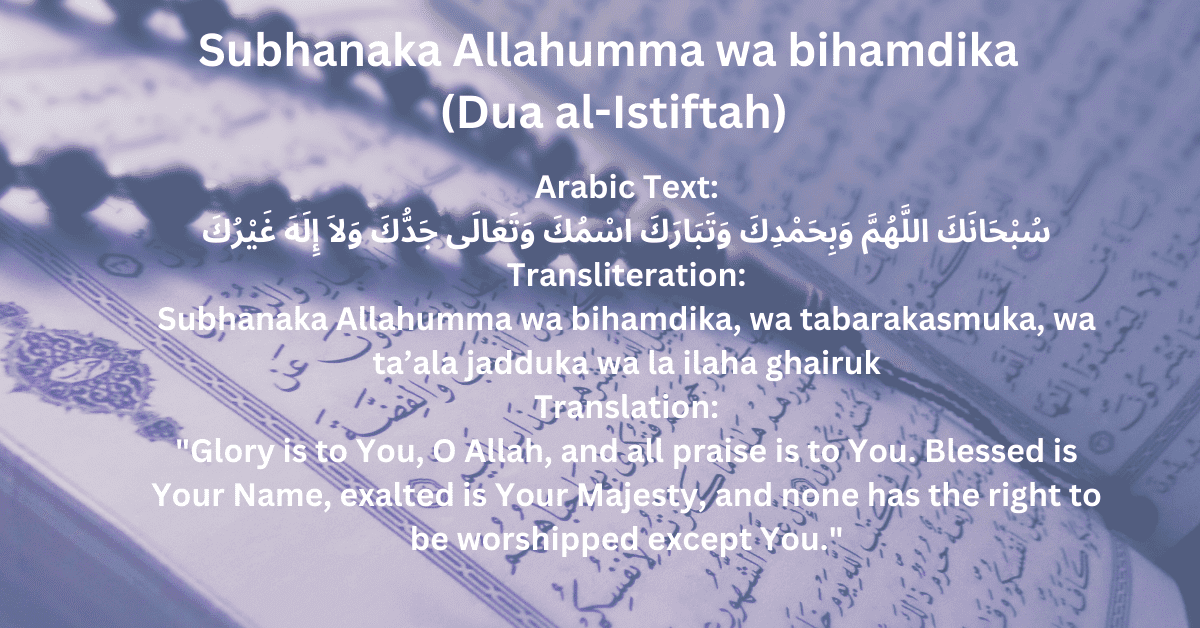Blog
Dua & Surah PDF
dua al-istiftah, dua al-istiftah in arabic, importance of dua al-istiftah, sana subhanaka allahumma, sana subhanaka allahumma wa bihamdika, sana subhanaka allahumma wa bihamdika in english, subanaka allahumma dua, subhana kallahumma wa bihamdihi, subhanak allahumma wa bi hamdika, subhanaka allahuma dua, subhanaka allahuma wabi hamdika, subhanaka allahumma, subhanaka allahumma wa bihamdika, subhanaka alllahumma dua, subhanaka hadith, wa bihamdika
pdfislamicdua
0 Comments
Subhanaka Allahumma wa bihamdika (Dua al-Istiftah)
Aisha (RA) narrated that when the Prophet Muhammad (ﷺ) started his prayer, he would say:
“Subhanaka Allahumma wa bihamdika, wa tabarakasmuka, wa ta’ala jadduka, wa la ilaha ghairuk” (Jami` at-Tirmidhi, Abu Dawud).

Subhanaka Allahumma wa bihamdika In Arabic With Meaning
Arabic Text:
سُبْحَانَكَ اللَّهُمَّ وَبِحَمْدِكَ وَتَبَارَكَ اسْمُكَ وَتَعَالَى جَدُّكَ وَلاَ إِلَهَ غَيْرُكَTransliteration:
Subhanaka Allahumma wa bihamdika, wa tabarakasmuka, wa ta’ala jadduka wa la ilaha ghairukTranslation:
“Glory is to You, O Allah, and all praise is to You. Blessed is Your Name, exalted is Your Majesty, and none has the right to be worshipped except You.”
Where Does This Dua Come From?
This beautiful dua comes from the teachings of Prophet Muhammad (ﷺ) and is found in authentic Hadith collections such as:
- Jami` at-Tirmidhi 243
- Sunan Abi Dawud 776
Aisha (RA) narrated that when the Prophet Muhammad (ﷺ) started his prayer, he would say:
“Subhanaka Allahumma wa bihamdika, wa tabarakasmuka, wa ta’ala jadduka, wa la ilaha ghairuk” (Jami` at-Tirmidhi, Abu Dawud).
When Should You Recite This Dua?
You should recite this dua right after making your Niyyah (intention to pray) and saying the opening Takbeer (when you say “Allahu Akbar” to start the prayer). This dua is recommended (Sunnah), but it’s not mandatory. If you forget to say it, your prayer is still valid.
Benefits of Reciting This Dua
- Praise and Gratitude: You are glorifying Allah and expressing gratitude for His countless blessings.
- Affirming Allah’s Oneness: By saying “there is no god but You,” you confirm that only Allah deserves worship.
- Honoring Allah’s Name: You acknowledge that Allah’s Name is blessed and His greatness is beyond measure.
- Focusing Your Mind: This dua helps you prepare mentally and spiritually for your prayer, reminding you of Allah’s greatness and your reliance on Him.
- Following the Sunnah: Since Prophet Muhammad (ﷺ) used to say this, reciting it helps you follow his example, which brings blessings and a closer connection to Allah.
Other Important Points
Known as Dua al-Istiftah: This dua is also called the opening supplication because it’s said at the beginning of the prayer.
Other Versions of the Opening Dua: There are other authentic opening supplications from the Prophet (ﷺ), like
“Allahu Akbar Kabira, walhamdulillahi Kathira, wa Subhanallahi bukratan wa asila” (Sahih Muslim).
Can Be Used as Dhikr: While this dua is recited in Salah, it can also be said outside of prayer as a form of remembrance (dhikr) of Allah.
Common Questions
Is it mandatory to recite this dua?
No, it is Sunnah (recommended) but not obligatory. If you don’t recite it, your prayer is still valid.
What is Sana or Subhanaka?
Sana is another name for this opening supplication that starts with the words Subhanaka Allahumma.
When should I skip Sana in prayer?
- If you join the prayer and the Imam is already reciting Quran, you don’t need to say Sana. Just join the prayer silently.
- If you catch the Imam in ruku (bowing), you can recite Sana if there’s enough time, but if not, skip it and follow the Imam.
- If you’re late and need to make up missed rak’ahs, recite Sana when you stand to complete them.














Post Comment